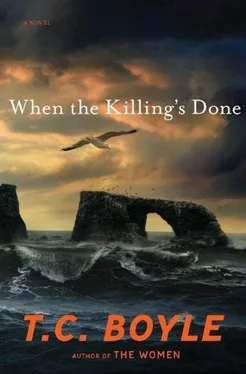His first thought — and here he steels himself, ready to call out a warning or better yet a threat — is for intruders, burglars, thieves, but then he sees the shadows there, two of them, humped close to the ground, and thinks of the dogs, but the dogs are in the house where he left them. It takes him a moment before he understands that these are nature’s animals, wildlife, come to enjoy what he’s provided for them. Very slowly, with exaggerated caution, he slides along the length of the car, and with both hands, one to turn the key and the other to keep the lid from springing all the way up, he quietly slips open the trunk. There’s a wince of escaping light, and then he has the flashlight in hand, thinking, Coyote? Or just a neighbor’s dog? as he eases it shut again, stifling the click of the lock with the pressure of his hand.
He forces himself to stand stock-still, listening, until the smallest sounds begin to drift to him out of the shadows. What does he hear? A soft wet swishing, the faintest tick of breathing or mastication, then a rustle, a soughing, then nothing. He’s almost afraid to lift his feet and so he shuffles forward, an inch at a time, the darkened cylinder of the flashlight held out before him like a homing device — he wants to get closer before switching it on, wants to be as close as he can before the light explodes and the animals scatter. He can feel the excitement building in him, the lure of the strange, the recondite, the hidden world that prowls through the dead hours of the night. A step closer, then another. And then, at the edge of the lawn, shadows enfolding shadows as if there were infinite depth to the night, as if the night were an ocean, as if he were underwater, in a cave, feeling for signs of the blind cave fish, he flicks on the light.
Two raccoons, their eyes flaming as if they were the source of the light and not he, stare up at him, the gray gloves of their paws arrested and revealed for the fraction of a moment, and then they turn away from him as if he weren’t there at all, and go on with their business. Which, he sees now, is digging. They bend forward, paw at the turf, then rock back on their haunches, feeding something into the dark absence of their mouths. He runs the light over the belly of the lawn, each individual blade of grass clutching its shadow, and sees, in fact, that the new lawn is already pocked with holes, moonscaped, as if it were the apron of a driving range. It takes him a moment — this is nature, these are wild creatures, he is the interloper here and they the inheritors of the hills that have run continuous up the coast all the way to Alaska from the time the glaciers lost their traction — before he shouts out. “Get out of that! Get!” he cries, trying to pin them with the beam and clap his hands at the same time, running now and watching the two shifting golden forms pull back reluctantly and scoot over the ruined turf to the wall, which is no impediment at all.
In the morning, after a closer inspection of the damage, he dials the number of Bruce Diaz, the friend of Wilson’s whose crew installed the lawn. He lets the phone ring eight times before hanging up — patience is not one of his virtues — and dialing again. On the fifth ring a woman answers in Spanish—“ ¿Bueno? ”—and his mind goes momentarily numb until he can think to say, “¿Quiero hablar con Bruce? ¿Por favor?”
There’s a shuffling and wheeze, voices mingling and separating, the muffled bark of a dog. Then Bruce’s voice, too loud, comes hurtling at him: “Yeah?”
“Bruce?”
“Yeah?”
“It’s Dave LaJoy.”
There’s a silence.
“You installed a new turf lawn for me yesterday?”
“Yeah, sure. Dave. Okay. Sure.”
“Well, it’s all full of holes. I mean, I get home at midnight, I haven’t even had a chance to see the job yet, and I turn on the flashlight and all I see is holes and bunches of dirt and dead grass piled up.”
Another silence.
“Bruce, you there?”
“Raccoons,” he says finally, as if reluctant to pronounce the name of the guilty party. “They’re after the worms — nightcrawlers, you know? Worms are part of the product, necessary, you understand? For aeration, fertilizer. You get rid of the raccoons, the holes’ll grow over in a week, you won’t even know they were there.”
But here it comes, rising in him, and he just can’t stop it. “You mean you’re not even going to get your ass over here and take a look? This a new lawn, new. I didn’t pay for any raggedy torn-up piece of second-rate shit .” There’s an unfortunate emphasis on the last epithet, because the pressure is ticking in him now, scraping away at the core of him like a thousand gray-gloved little claws. “I’ll cancel that check quicker than you can spit.”
The voice that comes back over the wire is so reduced he can barely hear it. “Ten-thirty,” Diaz says. “But I tell you, it’s raccoons. I could lay a whole new lawn tomorrow and it won’t make a lick of difference.”
Diaz — tall, with the build of a heavyweight gone to seed — appears half an hour later and stands with him on the lawn looking down sadly at the cored-out scatters of turf, the whole thing like a big green blanket the moths have got to, tells him he’ll replace the worst two strips at no cost at all, and then lifts his head to look him square in the eye. “But on condition you get rid of the raccoons first.”
“How do I do that?”
“Call Animal Control,” he says, and then he’s shuffling off to his pickup truck and the gate is opening magically for him and he’s gone.
Animal Control — amazingly, they answer on the first ring — informs him, through the offices of some overblown sandpaper-voiced clown half a step removed from a rent-a-cop, that they don’t trap raccoons. He’s in no mood. In the interval between the departure of Bruce Diaz and this phone call, Anise called to wonder what he was doing because maybe she was mistaken but hadn’t they agreed on eleven o’clock for him to come by for her and her mother to go wine-tasting over the hill in the Santa Ynez Valley, and he was maybe just a tad abrupt with her. But now, before he can respond— Well, what the fuck are we paying you for then? is on his lips — the person on the other end, the Animal Control officer, says, “But we’ve got the traps here and you’re welcome to come down and pick them up on overnight loan. Or we can do long-term too.”
This takes him by surprise. “By traps, what do you mean? They don’t, I don’t know, hurt the animal — do they?”
“No, no, no — these are Havahart traps, same as you use for rats and mice, only bigger.”
“A lot bigger, I hope.”
There’s an odd aspirated sound over the line as if the man on the other end were stifling a yawn. Or a laugh. Maybe he finds this funny. Maybe he’s in Animal Control for the sheer hilarity of it, just to get his rocks off. “You’re going to need a pickup or SUV,” the man says finally.
It takes him a moment, picturing it. And then, with the phone to his ear, already on his way out the door to back the Yukon out of the garage, he thinks to ask, “What about bait?”
“Peanut butter. Peanut butter’ll catch anything. They love it, let me tell you. But if you want to get fancy, just open a can of sardines, and you’ll have every raccoon in the neighborhood fighting to get in — and half the cats and opossums too.”
Again he pauses, the connection breathing static in his ear. One detail remains, and it looms up now like a submerged log riding a contrail of swamp gas. “Okay, yeah, but once I catch them, what do I do with them?”
Wine-tasting. To his mind it’s just a euphemism for getting shit-faced in the middle of the afternoon, the kind of activity tourists and busloads of retirees get a charge out of, but as it turned out he was glad of it. For a few hours, it took him out of himself, and after their second stop — at a place he loved, the cellars cold and dank, the great oaken casks standing in ranks like monuments to all those corrupted livers of the past — he really loosened up for the first time in what seemed like weeks. Not that he hadn’t felt the tension lift when they’d motored out of the marina the previous morning, but by the time they got to the island he was twisted up inside all over again. So the wine-tasting was a nice break. And he enjoyed Rita — she seemed to like him, respect him even, unlike his ex-wife’s mother, who regarded him out of her black Sicilian eyes as if he were the Antichrist and jumped up from her chair with a little gasp every time he stepped into the room, wailing, Oh, God, does he sit here?
Читать дальше












